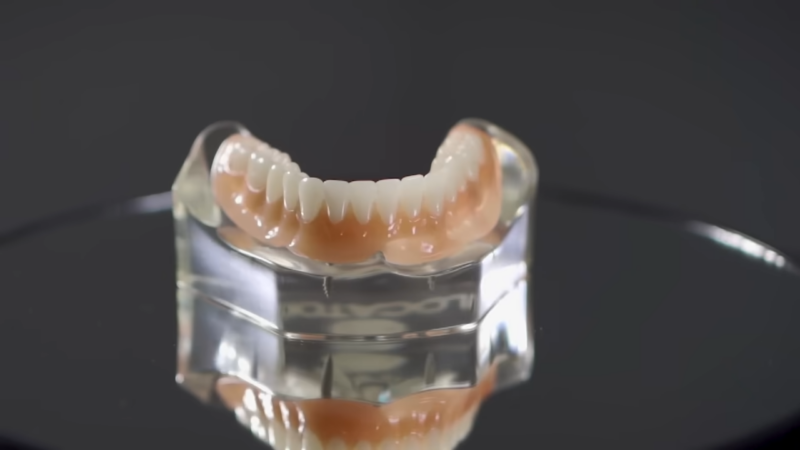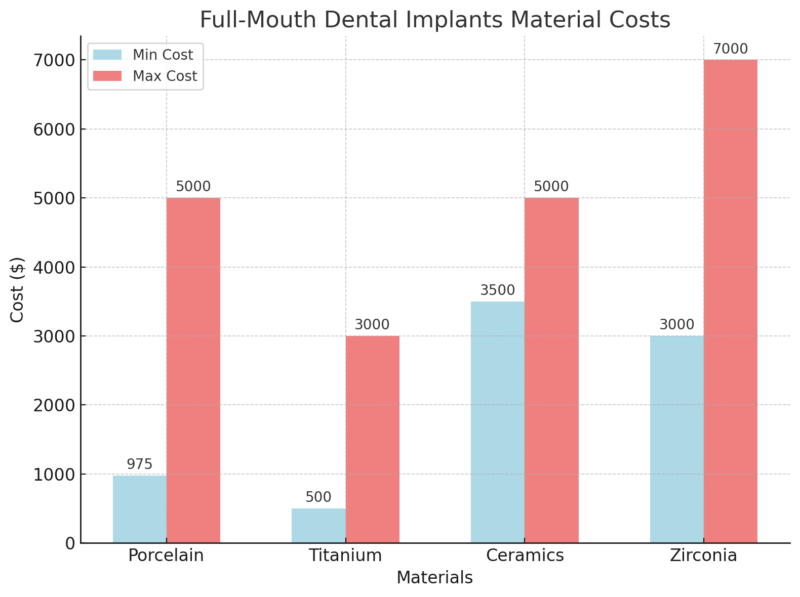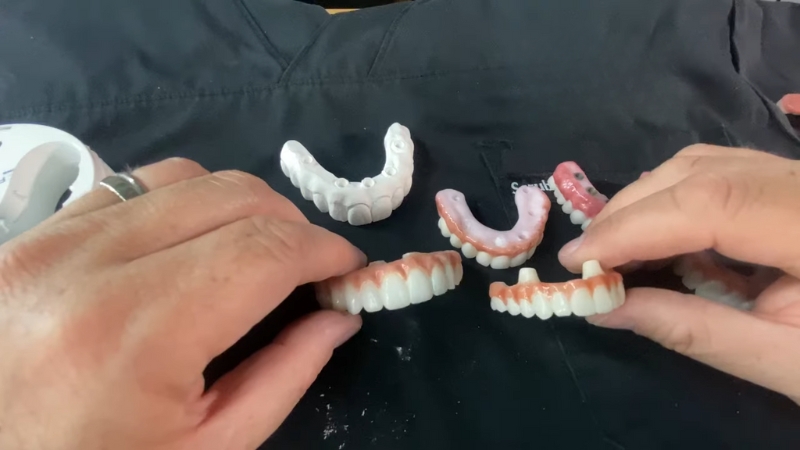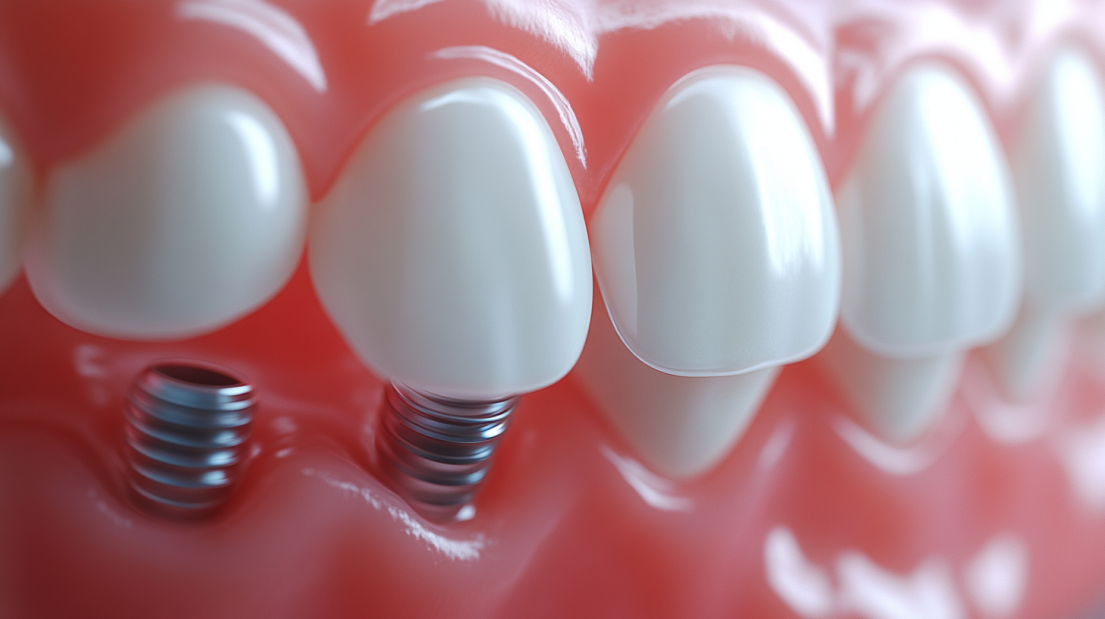Tooth loss is a widespread concern in the United States, affecting 178 million Americans, with 40 million having lost all their teeth.
Despite this, the annual number of dental implant treatments remains low, at approximately 2.5 million.
These figures highlight why dental implants can be a significant investment for many.
Key Takeaways
Cost of Full-Mouth Dental Implants

The cost of full-mouth dental implants varies based on the type of procedure, materials used, and associated treatments.
Here’s a detailed overview of the primary options:
1. Implant-Supported Dentures
Implant-supported dentures are designed to replace multiple teeth simultaneously.
Unlike traditional dentures that rest on the gums, these dentures are securely anchored to the jawbone using dental implants.
This approach provides enhanced stability and support, making it easier to eat and offering a more durable, long-lasting solution.
2. Implant-Supported Bridges (All-on-4 or All-on-6 Implants)
These are commonly referred to as All-on-4 or All-on-6 implants.
This method replaces missing teeth using a dental bridge supported by implants, with artificial teeth positioned between them.
This option offers a natural appearance, improved stability, and exceptional durability.
It is suitable for patients with sufficient gum tissue to support the implants.
Additionally, implant-supported bridges help prevent bone loss and maintain the integrity of the facial structure.
3. Single Tooth Implants
View this post on Instagram
For patients requiring dental implants in different areas rather than a single location, single-tooth implants are an excellent option.
This approach is ideal for individuals who still have most of their natural teeth but need replacements for specific missing ones.
Single-tooth implants allow for targeted replacement, providing a long-lasting solution that can endure a lifetime with proper care and maintenance.
This flexibility ensures patients can address their dental needs individually as they arise.
Factors Influencing the Cost
The final cost of full-mouth dental implants depends on various factors, including:
1. Material Used

The choice of material impacts durability, aesthetics, and overall cost.
2. Number of Implants
Typically, 4, 6, or 8 implants are utilized per arch to secure dentures or a dental bridge.
For instance, with the average cost of a single implant being approximately $2,800 (excluding insurance), the total cost for a 4-implant-supported arch would be around $11,200, not accounting for additional expenses like preparatory procedures or materials.
On the other hand, if individual implants are placed for each missing tooth, the overall cost becomes significantly higher compared to multi-implant-supported solutions, making it a more expensive option for full-mouth restoration.
3. Additional Procedures
Preparatory procedures can significantly increase costs. These include:
Procedure
Average Cost Range
Gum Grafting
$600–$1,200 per tooth
Bone Grafts
$300–$800 each graft
Sinus Lift
$1,500–$3,000 per arch ($3,000–$5,000 on both sides)
Abutments
$700–$2,000
Dental Crowns
$800–$3,000
Anesthesia
$50–$100
Pre-op Tests
$50–$200
Tooth Extraction
$150–$300 per tooth
Tooth Cleaning
$75–$200
5 Ways to Pay for Full-Mouth Dental Implants
1. Dental Insurance
Most dental insurance plans cover 50% to a maximum of 80% of the cost (if eligible).
This significantly reduces the patient’s out-of-pocket expenses.
Patients with good insurance coverage can typically cover the remaining balance using savings or flexible monthly payments.
2. Dental Financing
Many dental providers offer in-house financing or partner with third-party financing companies like CareCredit, AccessOne, or Denefits.
Each option has its own benefits, but Denefits stands out by enabling dental practices to cater to different budgetary needs without additional costs, ensuring secure transactions and flexibility not often found in other financing solutions.
3. Flexible Payment Plans

Flexible payment plans are an excellent way to spread the cost over time.
Providers like Denefits allow dental practices to offer tailored payment solutions, enabling patients to pay in manageable monthly installments while ensuring consistent cash flow for the practice.
4. Payment Plans With Deferred Interest
Deferred interest payment plans let patients pay off their balance within a specified period without incurring interest.
For example, Denefits’ EZ Payment Plan offers a 12-month deferred interest period.
If the full amount is paid within this timeframe, patients avoid interest, though interest may be applied for balances carried beyond the deferred period.
5. Health Savings Accounts (HSAs) and Flexible Spending Accounts (FSAs)
HSA vs. FSA—What’s the Difference?
A Health Savings Account (HSA) or Flexible Savings Account (FSA) can help members save thousands of dollars every year on healthcare costs. Learn more about each offering and discover which works best for your lifestyle: https://t.co/3NZIesIzX9 pic.twitter.com/LyBl2DXnlh
— HealthEdge (@HealthEdge) December 3, 2024
Dental implants often qualify as eligible procedures under HSA and FSA plans.
Patients can use these tax-advantaged accounts to cover the out-of-pocket costs not covered by insurance, making it easier to prepare financially for the procedure.
For example, a tooth filling can cost anywhere from $100 to $400 without insurance, which can add up quickly for those needing multiple fillings.
Is Full-Mouth Dental Implant Treatment Worth It?
Full-mouth dental implants offer a transformative solution for those with extensive tooth loss.
Beyond aesthetics, they restore functionality, improve oral health, and enhance overall quality of life.
While the costs may seem daunting, the longevity and benefits often justify the investment.
Patients are encouraged to consult their dentist to explore personalized financing options and payment plans.
With the right approach, the dream of a restored smile is within reach.

